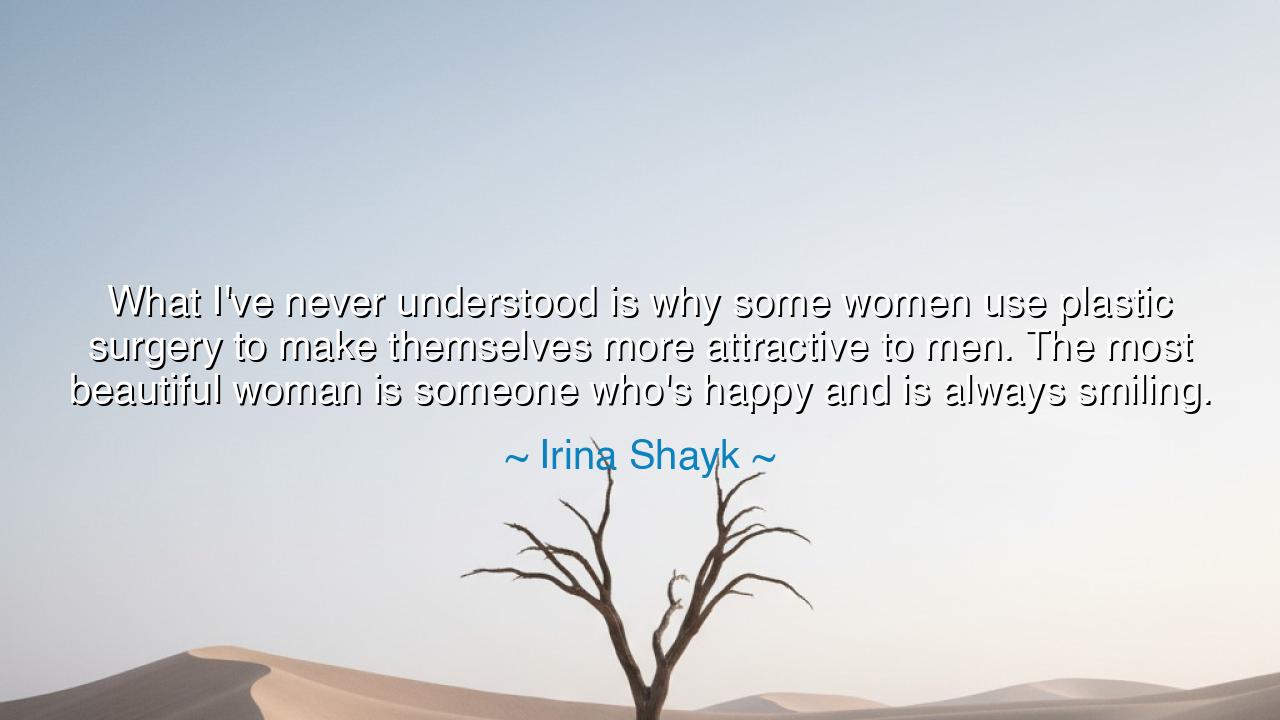
What I've never understood is why some women use plastic surgery
What I've never understood is why some women use plastic surgery to make themselves more attractive to men. The most beautiful woman is someone who's happy and is always smiling.






Irina Shayk, whose life has been lived beneath the gaze of countless eyes, gave us a truth that pierces deeper than the mirror: “What I’ve never understood is why some women use plastic surgery to make themselves more attractive to men. The most beautiful woman is someone who’s happy and is always smiling.” In this, she lifts a veil from our age of appearances and reminds us of an eternal principle: that beauty is not carved into the skin but radiates from the soul.
The meaning of her words is plain yet profound. Many believe that attractiveness is a matter of proportion, symmetry, or youthfulness, and thus seek to alter the body through artifice. But Shayk declares this pursuit a misunderstanding. For a face may be flawless in form, yet lifeless in spirit. True beauty is not born in the surgeon’s hands but in the heart that overflows with happiness, in the lips that carry a smile freely given. It is the light of joy, not the shadow of perfection, that draws others near.
History offers us proof of this truth. Cleopatra, though remembered as a queen of great allure, was not praised foremost for her features, but for her wit, her charm, her radiant presence. Chroniclers said that her beauty lay in her voice, her laughter, her confidence, not in sculpted symmetry. So too with Eleanor Roosevelt, who never matched the ideals of magazine covers, but whose strength, warmth, and courage made her beloved across nations. Their greatness did not come from altering their form, but from embodying their spirit.
The opposite lesson is also written in history. Many rulers, queens, and nobles adorned themselves with jewels, dyes, and surgeries of their own times, believing outward alteration would secure love or power. Yet their stories often end in sorrow, for no veil of artifice could conceal insecurity, cruelty, or emptiness within. Beauty, falsely pursued, is beauty that withers. But beauty lived as joy, beauty lived as happiness, endures even when the body ages.
Shayk’s words also reveal the subtle tyranny that women endure—the demand to appear always as objects of desire for men. She questions why so many take up the knife not for themselves, but to meet an imagined expectation. True freedom, she implies, is not in pleasing the gaze of others, but in living from within, letting joy shine without shame or fear. A smile, born of genuine contentment, carries more power than any mask of perfection.
The lesson for us is radiant: if you would be beautiful, do not look first to the mirror, but to the heart. Cultivate gratitude, laughter, and joy. Let your life be full of moments that bring genuine happiness—friendship, kindness, purpose, love—and your face will shine with a light no hand can craft. This is the beauty that never fades, for it is not surface, but spirit.
Practical action is this: care for your body with respect, but do not worship its image. Seek joy in the simple and let it carry into your countenance. Practice smiling not as performance but as reflection of real contentment. Surround yourself with people, work, and passions that nourish the soul, for from this nourishment flows a beauty that no passing fashion can erase.
So let Irina Shayk’s words endure as a call to wisdom: the most beautiful woman is not she who alters herself for approval, but she who is happy and smiling. May every woman and every man remember this truth, and may they free themselves from the tyranny of appearances. For joy is beauty’s eternal fountain, and those who drink of it will never lack radiance.






AAdministratorAdministrator
Welcome, honored guests. Please leave a comment, we will respond soon